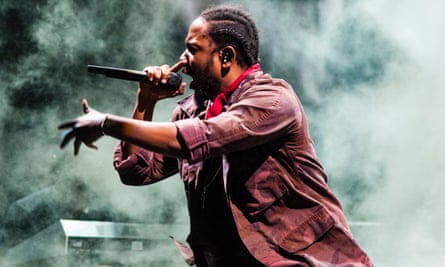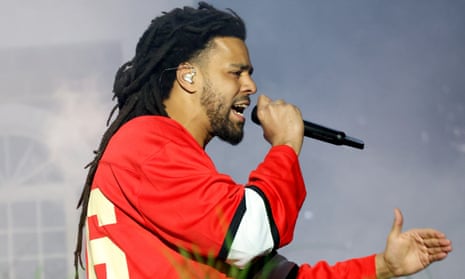Did you hear the news? Rapper J Cole fell out with rapper Kendrick Lemar. Then he apologised. It made headlines all over the world and, for the uninitiated to the world of hip-hop beefs to fully understand it all, the BBC published an explainer.
You may have missed or ignored this, on the basis that you were paying attention to the real issues of that day, but I’m sorry, for this was legitimate news that day. For rappers – whether the hugely successful conscious kind, such as J Cole and Kendrick – or the wildly successful big hitters of the gangsta rap class – long ago graduated from being just rappers, just musicians. Those at the top of the game are creative giants, the poster children for modern commercial capitalism.
They are the multinational masters of branding, deal-making, social media, marketing, profit, loss, diversification. If Mark Zuckerberg wants to cage fight Elon, we sit up; but so it is, and so it should be, with J Cole and Kendrick. Alongside the billionaire men in suits – and designer T-shirts – this is what a corporate giant looks like in 2024 and beyond.
Consider two figures, symbols of where we have been and where we are going: legendary rapper, record producer, and entrepreneur Jay-Z, and Warren Buffett. It is virtually impossible to have a conversation about business genius without mentioning the $100bn-plus man Buffett. Yet the likes of Jay-Z are hardly mentioned, despite the fact that, arguably, they have much more to teach the mortal world about success in business than Buffett could fathom. I look at Buffett and Jay-Z and I know which of them should fill out the curriculum at the Harvard Business School.
In my new book, The Hip Hop MBA: Lessons in Cut-Throat Capitalism from Rap’s Moguls, I compare and contrast their records. Buffett got his start selling chewing gum and magazines door to door; Jay-Z apparently set out selling crack cocaine. Both had setbacks; Buffett was rejected by Harvard despite his obvious talent: he had to settle for Columbia. Jay-Z, meanwhile, was rejected by most major record companies and may well, according to longstanding interpretation of his track Never Change, have mislaid 92 bricks of someone else’s cocaine, which would have blotted his copybook in a way that usually leads to accident and emergency and a basement mortuary.
It’s a measure of the man that he survived the ignominy long enough to launch his own record company, to be hailed as the greatest rapper of all time, and to amass a fortune estimated at $2.5bn. Buffett has $115bn, according to Forbes last year. But then, at 93, Buffett had a head start, and one might guess he’s peaked.

And so, alongside the tech giants and the one percenters, we see the rappers are having their time. If you wish to get a project green-lit in today’s Hollywood, it helps to have the phone number of muscle bound Get Rich or Die Tryin rapper 50 Cent (who has almost singlehandedly driven the success of the Starz network with his multi-strand drama series Power). Film and TV executives are known to salivate at the lucrative prospect of getting a major rap mogul involved in a project.
And then there is Snoop Dogg, who was once charged with murder but acquitted, and is perhaps the most diversified conglomerate known to man, with his film career, reality shows, branded wine, branded cereal, canned gin-and-juice beverages, dogwear fashions, food delivery ads (“did somebody just say…”), photography apps (he says he was the first celebrity on Instagram), insurance promotion – he sells it all. This list is endless. Apparently he still raps, too.
What about Dwayne “Megaman” Vincent? As a teenager he founded and led Battersea’s 35-person strong So Solid Crew to success. A pockmarked life, for sure – he spent a year in jail on remand before being cleared, after three Old Bailey trials, on a murder charge, but universities should be begging him to teach courses on leadership and fearless entrepreneurialism.
Let’s have more respect for the Dr Dres, the Will (happy-slappy) Smiths and the Ice Cubes – he of the journey from NWA to gangsta rap to the Barbershop movie franchise.
Once we would have mentioned Kanye, who is drippingly rich but saw his stock crash after antisemitic comments that lost him kudos and massive commercial contracts. Yet he still managed to top the charts as an independent artist.
We will mention Suge Knight, the Death Row Records impresario, who from his prison cell, where he records a podcast, this week instructed the publicly contrite J Cole to keep on fighting or go off and become an R&B singer. Knight was jailed for 28 years for mowing down and killing a friend and business associate while trying to escape a melee near the set of the NWA biopic Straight Outta Compton . He ran his multimillion-dollar business; he lived the life.
And there’s Drake, the new king of pop and a human money-printing machine. Universal Music Group two years ago signed him to a $400m multi-project deal.
Consider the acumen of the hip-hop moguls and you see some of the standout capitalistic creative and entrepreneurial talents of our era. They have their beefs, their scandals and controversies, but when J Cole disses Kendrick and when J Cole apologises, they make headlines and they make a lot more money. It’s all over the media, it’s all good business. It’s all good, as they say.
Nels Abbey is a writer, broadcaster and former banker. He is the author of Think Like a White Man and the newly released Hip-Hop MBA: Lessons in Cut-Throat Capitalism from Rap’s Moguls. He is also the founder of Uppity: The Intellectual Playground

